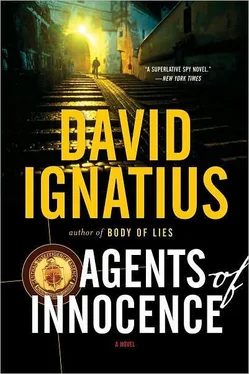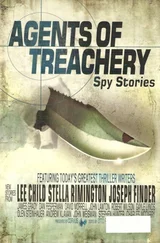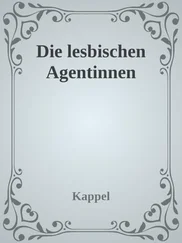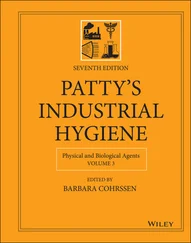David Ignatius - Agents of Innocence
Здесь есть возможность читать онлайн «David Ignatius - Agents of Innocence» весь текст электронной книги совершенно бесплатно (целиком полную версию без сокращений). В некоторых случаях можно слушать аудио, скачать через торрент в формате fb2 и присутствует краткое содержание. Жанр: Шпионский детектив, на английском языке. Описание произведения, (предисловие) а так же отзывы посетителей доступны на портале библиотеки ЛибКат.
- Название:Agents of Innocence
- Автор:
- Жанр:
- Год:неизвестен
- ISBN:нет данных
- Рейтинг книги:3 / 5. Голосов: 1
-
Избранное:Добавить в избранное
- Отзывы:
-
Ваша оценка:
- 60
- 1
- 2
- 3
- 4
- 5
Agents of Innocence: краткое содержание, описание и аннотация
Предлагаем к чтению аннотацию, описание, краткое содержание или предисловие (зависит от того, что написал сам автор книги «Agents of Innocence»). Если вы не нашли необходимую информацию о книге — напишите в комментариях, мы постараемся отыскать её.
Agents of Innocence — читать онлайн бесплатно полную книгу (весь текст) целиком
Ниже представлен текст книги, разбитый по страницам. Система сохранения места последней прочитанной страницы, позволяет с удобством читать онлайн бесплатно книгу «Agents of Innocence», без необходимости каждый раз заново искать на чём Вы остановились. Поставьте закладку, и сможете в любой момент перейти на страницу, на которой закончили чтение.
Интервал:
Закладка:
The agent in Damascus didn’t know the identity of the American contact in Fatah. But he reported the guesses made by the PFLP leadership. The American agent had to be someone high up in the Fatah intelligence network. Only an intelligence man would be given the job of intermediary, the radicals said. The most likely suspect, concluded the agent’s report, was the young man who had risen so quickly in the Rasd-the Old Man’s pet, Jamal Ramlawi.
PART VII
1971-May 1972
31
Beirut; Spring 1971
Mohammed Nasir Makawi, known as Abu Nasir, was a dark, intense man with a thin face and a thick mustache. He was Fatah’s chief of intelligence and he looked the part. His eyes were deeply set and so ringed with circles that they seemed to be perpetually in shadow. Like many of the best Arab intelligence officers, he had a deadpan, expressionless face that gave nothing away.
Abu Nasir lived in Beirut, on the sixth floor of a building on the Rue Verdun, a busy street that sloped southward from the center of West Beirut toward Corniche Mazraa and the sea. He worried about the security and planned to install a blast-proof metal door at the entrance to the apartment. He wasn’t sure what to do about electronic surveillance. One of his Russian friends had advised him that the only way to be certain you weren’t bugged was to build new walls, ceiling, and floorboards on top of the old ones-covering over any hidden microphones. That seemed like too much work. So Abu Nasir played the radio.
The apartment was sparsely furnished. A brown couch with too much stuffing, an easy chair covered in the same fabric, a large television set that dominated the living room, a small wooden table, and a cheap, machine-made tapestry that spelled out the name of Allah in elaborate Arabic script. The only real decoration was a large nargilleh pipe, which stood next to the easy chair. The blinds were drawn tight, which added to the dark and desolation of the room.
Abu Nasir sat on his brown couch, watching a banal Egyptian soap opera on Lebanese television. He was waiting for his young deputy, Jamal Ramlawi.
Jamal was late. He is romancing some young woman, Abu Nasir thought to himself. That is his weakness. He had called Jamal that morning at the apartment where he was staying in Fakhani. Come by this evening for a talk, Abu Nasir had said. Just you and me. I will explain to you what we are planning. As he made the invitation, Abu Nasir had heard the voice of a woman in background, singing in Italian.
The bell rang. One long and two short. Abu Nasir opened the door and embraced Jamal. The young man was dressed more neatly than usual, in gray trousers and a blue shirt rather than his usual jeans and leather jacket. His hair was slicked back against his head. The younger man kissed his host twice, and then a third time. Abu Nasir looked almost frail in the embrace of his young protege.
Abu Nasir excused himself to fix coffee. That was part of life in the shadows: You learned to mend your own trousers, sew your own buttons, make your own coffee. He filled the pot half-full with coffee that had been ground to a fine powder, added four tablespoons of sugar, poured in a little water, and let the rich mixture come to a boil three times. The result was a thick black sludge, sweet and syrupy on the tongue.
When the coffee was done, Abu Nasir carried the pot and two small cups into the living room and poured one cup for Jamal. He poured another for himself, settled down in the easy chair, and lit up the water pipe. He sucked on the wooden mouthpiece until the room was thick with smoke. The gaunt man old man seemed oblivious to anything but his own concerns. Sucking on his pipe, blowing out the smoke. Measured, calculating.
“Have I ever told you about my village in Palestine?” asked Abu Nasir eventually, putting aside the pipe and lighting a cigarette.
“No, Uncle,” said Jamal.
“Perhaps I should tell you the story,” said Abu Nasir, as if he had not quite made up his mind.
“You would do me an honor.”
“It is quite a long story, I am afraid.”
“I would like to hear it, Uncle.”
The older man nodded.
Abu Nasir liked to tell stories: long, meandering tales whose meaning or relevance often wasn’t evident until the last chapter. But there was always a lesson-precise and perfectly fashioned-that would come into view slowly like the outline of a castle emerging from a thick fog. Nobody ever interrupted Abu Nasir. As he talked, he would fix his gaze on his listener. Clouds of cigarette smoke would billow around his face and blow gently away with the rise and fall of his voice.
“Do you remember the old Jaffa Road in Palestine that ran from Jerusalem to the sea?” Abu Nasir began.
“No, Uncle, I don’t.”
“Of course you don’t. You were too young, so I’ll tell you about it. The road climbed from the coast up through the hills surrounding Jerusalem. Just before it reached the city, on the last steep hillside, if you looked to the left you could see a fine Arab village, with an arc of stone houses arrayed against the hillside.
“That was the village of Lifta, and it was the home of my family for many generations.”
“Lifta,” said Abu Nasir again, repeating the word quietly, as if the very sound was a remnant of his lost village. “I feel as if I can remember every detail of it, though I left more than twenty years ago. The cool of the stone house in the summer; the smell of bread baking on hot rocks in the courtyard; sleeping on the roof in the summer with my father; the taste of water from the well that I thought must be bottomless.
“I watched Lifta change. Jerusalem kept pushing west toward us in the 1930s. Jews coming from Europe settled along the Jaffa Road, in a suburb called Romema. We didn’t think too much about it. Jews had lived in that area since anyone could remember. And besides, some of our villagers were making money selling land to the Jews.”
“You sold land to the Jews?” asked Jamal.
“We were naive. And we were greedy. Liftawis owned so much land-nearly to the walls of the Old City-that we didn’t mind losing just a little bit of it. And a bit more. What did we care? We were getting rich. People said that Lifta was becoming the richest village in Palestine, which made us all feel happy and proud.
“My father was one of the richest. He made money and he built himself a grand house up on the hilltop, away from the old village of Lifta and near the Jews. That was a mark of how successful he was. It was the biggest house in the area and people from Romema would come and stare at it. My father was a very modern man. He believed in progress and sent me to high school. I would walk along the Jaffa Road to school, past the shops and markets and coffeehouses, and think how lucky we were. We took no precautions in those days. We never thought about it! The Jews were all around us. We were their landlords. What could possibly happen to us?
“As I got older, I noticed that Romema was getting bigger and Lifta was getting smaller. You couldn’t even tell where Lifta was anymore, except for the stone houses of the old village on the hillside. It was all suburbs. But nobody worried. We were building and expanding and making money. There were a few young boys from the village who skirmished from time to time with the Jews along the Jaffa Road and tried to convince us that disaster was coming. But nobody in Lifta paid very much attention to them. We were so trusting and naive that we were lulled almost to sleep.”
“You were fools,” said Jamal.
Abu Nasir didn’t answer. He looked at Jamal with the expression of bemused tolerance that older men have for impetuous young men who imagine that they have invented bravery and cunning.
Читать дальшеИнтервал:
Закладка:
Похожие книги на «Agents of Innocence»
Представляем Вашему вниманию похожие книги на «Agents of Innocence» списком для выбора. Мы отобрали схожую по названию и смыслу литературу в надежде предоставить читателям больше вариантов отыскать новые, интересные, ещё непрочитанные произведения.
Обсуждение, отзывы о книге «Agents of Innocence» и просто собственные мнения читателей. Оставьте ваши комментарии, напишите, что Вы думаете о произведении, его смысле или главных героях. Укажите что конкретно понравилось, а что нет, и почему Вы так считаете.












